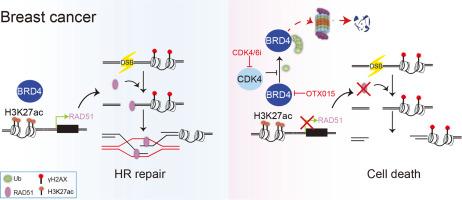BET inhibitor and CDK4/6 inhibitor synergistically inhibit breast cancer by suppressing BRD4 stability and DNA damage repair
IF 5
2区 医学
Q2 Medicine
引用次数: 0
Abstract
CDK4/6 inhibitors have shown clinical benefits in hormone receptor positive breast cancer. However, monotonous indications and unclear resistance mechanisms greatly limit the clinical application of these inhibitors. We attempt to improve the therapeutic effect of CDK4/6 inhibitors against breast cancer by combination with BET inhibitors. Although this combination therapy has begun to be studied in recent clinical trials, the mechanism of action is not clear. We provide the evidence that CDK4/6 inhibitor LY2835219 plus BRD4 inhibitor OTX-015 synergistically inhibits both ER positive and triple-negative breast cancer cells growth in vitro and in vivo. Mechanistically, LY2835219 accelerates the degradation of BRD4 through the proteasome pathway via inhibition of CDK4 activity. This instability of BRD4 protein in turn enhances the anti-tumor effect of CDK4/6 inhibitor by suppressing transcription of DNA damage repair gene RAD51, and synergistically promotes γ-H2AX accumulation and DNA double-strand breaks. Overall, we demonstrated the potential combined therapeutic value of CDK4/6 and BRD4 inhibitors and elucidated the mechanisms, which may provide a new rational approach for breast cancer patients.

BET 抑制剂和 CDK4/6 抑制剂通过抑制 BRD4 稳定性和 DNA 损伤修复协同抑制乳腺癌
CDK4/6抑制剂已在激素受体阳性乳腺癌中显示出临床疗效。然而,单调的适应症和不明确的耐药机制极大地限制了这些抑制剂的临床应用。我们试图通过与 BET 抑制剂联合使用来提高 CDK4/6 抑制剂对乳腺癌的治疗效果。尽管最近的临床试验已开始研究这种联合疗法,但其作用机制尚不明确。我们提供的证据表明,CDK4/6 抑制剂 LY2835219 加上 BRD4 抑制剂 OTX-015 能协同抑制 ER 阳性和三阴性乳腺癌细胞在体外和体内的生长。从机理上讲,LY2835219 通过抑制 CDK4 的活性,加速了 BRD4 通过蛋白酶体途径的降解。BRD4蛋白的不稳定性反过来又通过抑制DNA损伤修复基因RAD51的转录增强CDK4/6抑制剂的抗肿瘤作用,并协同促进γ-H2AX的积累和DNA双链断裂。总之,我们证明了CDK4/6和BRD4抑制剂潜在的联合治疗价值,并阐明了其机制,这可能为乳腺癌患者提供一种新的合理治疗方法。
本文章由计算机程序翻译,如有差异,请以英文原文为准。
求助全文
约1分钟内获得全文
求助全文
来源期刊

Translational Oncology
ONCOLOGY-
CiteScore
8.40
自引率
2.00%
发文量
314
审稿时长
54 days
期刊介绍:
Translational Oncology publishes the results of novel research investigations which bridge the laboratory and clinical settings including risk assessment, cellular and molecular characterization, prevention, detection, diagnosis and treatment of human cancers with the overall goal of improving the clinical care of oncology patients. Translational Oncology will publish laboratory studies of novel therapeutic interventions as well as clinical trials which evaluate new treatment paradigms for cancer. Peer reviewed manuscript types include Original Reports, Reviews and Editorials.
 求助内容:
求助内容: 应助结果提醒方式:
应助结果提醒方式:


